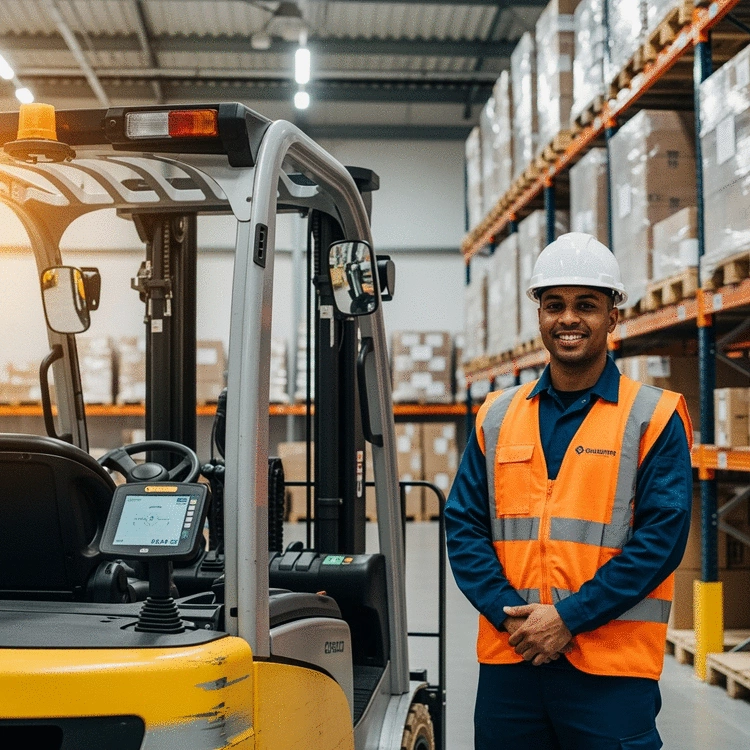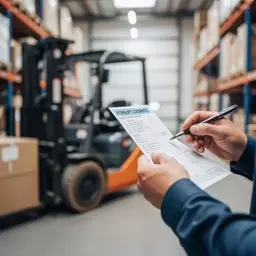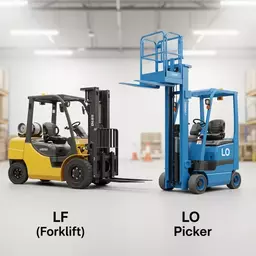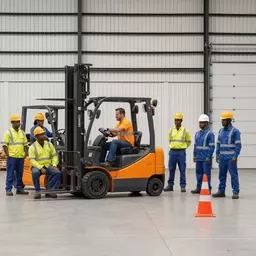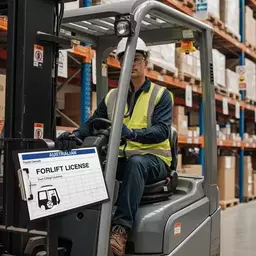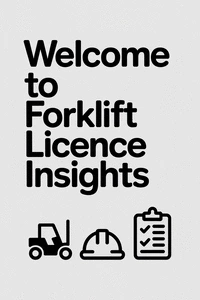As we look toward the future, the changes in the Australian forklift licence regulations for 2025 present both challenges and opportunities. Understanding these updates can significantly enhance safety and compliance in the workplace. Let's explore the essential takeaways that every forklift operator should know.
What You Will Learn
- Upcoming regulations in 2025 will introduce stricter training and assessment requirements for forklift operators.
- Compliance with these regulations is crucial for workplace safety and can prevent legal repercussions.
- Operators must be aware of different forklift licence classes and their specific operational permissions.
- Proactive engagement in training and knowledge about new safety protocols will enhance operational competence.
Key Changes & Requirements for 2025 Australian Forklift Licensing
The upcoming 2025 regulations introduce significant updates to enhance safety and compliance. Here's a breakdown of the key changes and operator requirements.
2025 Regulatory Updates Key Changes in Australian Forklift Licence Regulations
- • Increased practical training & assessment emphasis
- • New safety protocols & compliance measures
- • Greater recognition of interstate licensing
- • Streamlined application processes
Who Needs a Licence? Roles Requiring a Forklift Licence
- • Warehouse workers (loading/unloading)
- • Construction workers (on job sites)
- • Logistics & distribution staff
- • Material handling tasks
Licence Types Essential Forklift Licence Classes
- • LF (Forklift): Most common, for standard forklifts
- • LO (Order Picker): For high-rack order picking forklifts
- • LE (Elevated Work Platform): For lifting workers (not a forklift)
Eligibility Criteria Operator Age, Training, and ID Requirements
- • Minimum age of 18 years
- • Completion of nationally recognized training course
- • Provision of valid identification (e.g., driver's licence, passport)
Understanding the 2025 Australian Forklift Licence Regulations
As we approach 2025, it's crucial to get familiar with the upcoming changes in the Australian forklift licence regulations. These adjustments are set to enhance safety and compliance across the industry. This means that whether you're a seasoned operator or just starting your forklift licensing journey, staying informed is more important than ever!
One of the key updates includes stricter training requirements and a clearer pathway for certification. Compared to previous regulations, the 2025 framework emphasizes practical experience alongside theoretical knowledge. These changes are designed not only to elevate safety standards but also to ensure that operators are fully prepared for the challenges of handling forklifts in various environments, as highlighted by WorkSafe Western Australia's guidelines for forklift operators.
What Changes Are Happening in 2025?
- Increased emphasis on practical training and assessment
- Introduction of new safety protocols and compliance measures
- Greater recognition of interstate licensing
- Streamlined application processes for obtaining and renewing licences
These changes represent a shift towards a more rigorous approach to forklift operation. By understanding these updates, you can take proactive steps to ensure compliance and enhance your skills in line with the new standards.
Importance of Compliance with Forklift Licence Regulations
Complying with forklift licence regulations is of utmost importance. Not only does it protect the safety of operators and others in the workplace, but it also helps businesses avoid legal repercussions. As someone deeply invested in workplace safety, I can’t stress enough how critical it is to adhere to these guidelines.
Failure to comply can lead to serious consequences, including hefty fines, increased insurance premiums, and even workplace accidents. Maintaining compliance ensures that you're not just a qualified operator but a responsible one, committed to fostering a safe working environment. This is where the mission of Forklift Licence Insights shines—empowering you with the knowledge and resources needed to navigate these regulations effectively! Further information on managing health and safety licences can be found on Safe Work Australia's website.
Detailed Breakdown of Licensing Requirements for Operators
Who Needs a Forklift Licence in Australia?
In Australia, the requirement for a forklift licence applies to various roles. Primarily, any individual operating a forklift must possess a valid licence to ensure they are trained and competent for the task at hand.
- Warehouse workers operating forklifts for loading and unloading
- Construction workers using forklifts on job sites
- Logistics and distribution staff managing inventory
- Anyone involved in transportation or material handling tasks
It's essential to recognize the different positions that require a forklift licence to foster safety and compliance across all sectors. If you find yourself in any of these roles, it’s time to consider your licence options!
Essential Forklift Licence Classes Explained
Understanding the different classes of forklift licences is key to knowing what you can operate. In Australia, the most common types include:
- LF (Forklift): This licence allows you to operate a forklift. It's the most widely recognized and is essential for warehouse and logistics roles.
- LO (Order Picker): This class permits you to operate order-picking forklifts, ideal for high-rack warehousing.
- LE (Elevated Work Platform): While not a forklift per se, this allows you to operate platforms that lift workers to heights.
Each class has its own set of rules and training requirements, so it's important to choose the right licence based on your career goals and the equipment you’ll be using. For specifics on high-risk work licensing, including forklift operations, refer to the WA Government resources.
Age, Training, and Identification Requirements
When it comes to obtaining a forklift licence, specific eligibility criteria must be met:
- Minimum age of 18 years
- Completion of a nationally recognized training course
- Provision of valid identification, typically a driver's licence or passport
These requirements ensure that all operators are not only qualified but also capable of handling the responsibilities that come with operating a forklift. Ensuring you meet these standards is a crucial step in your licensing journey!
We Want to Hear From You!
As we navigate the changes in forklift licensing requirements, we want to know: What aspect of the new regulations are you most concerned about? Share your thoughts below:
Summary of Key Takeaways for Forklift Operators
As we look ahead to the 2025 forklift licence regulations, there are several key points that every forklift operator should keep in mind. Understanding these changes is crucial for maintaining compliance and ensuring safety in the workplace. Here’s a quick recap:
- New regulations will affect licensing requirements and operator competencies.
- Compliance is not just a legal obligation but also a vital aspect of workplace safety.
- Operators should be aware of the different classes of forklift licences and their specific permissions.
- Training and assessment are essential to meet the new standards introduced in 2025.
By familiarizing yourself with these points, you can take proactive steps to align with upcoming regulations and ensure a safe working environment. Remember, staying informed is key!
Next Steps for Compliance and Training
Now that you’re aware of the 2025 changes, it’s time to take action! I encourage all operators to review their current licences and understand how the new regulations affect them. Here are some practical next steps you should consider:
- Check your licence expiry date and renewal requirements.
- Research training providers that offer courses aligned with the updated regulations.
- Engage with your employer or peers to discuss any adjustments necessary for compliance.
Taking these steps will help you stay compliant and ready for the evolving landscape of forklift operation. Remember, investing in training now not only prepares you for the future but also enhances your skills and safety awareness on the job!
Frequently Asked Questions About Forklift Licences
In light of the upcoming changes, I often hear various questions from operators about forklift licensing. Understanding these common inquiries can help clarify important issues surrounding compliance. Here’s a look at some frequently asked questions:
- What are the penalties for non-compliance with forklift regulations?
- How do new technologies impact forklift operation and training?
- What are the key changes in Australian forklift licence regulations for 2025?
- Who needs a forklift licence in Australia?
- What are the essential forklift licence classes, and what do they permit?
- What are the age, training, and identification requirements for obtaining a forklift licence?
By addressing these questions, operators can better navigate their responsibilities and the evolving industry landscape. Let’s dive into each one for further clarity!
What Are the Penalties for Non-Compliance with Forklift Regulations?
Failing to comply with forklift licensing regulations can lead to serious consequences, including fines, legal action, and increased liability for both operators and employers. The specific penalties can vary based on the severity of the violation and the jurisdiction. It's essential to understand these risks to avoid jeopardizing your career and workplace safety.
How Do New Technologies Impact Forklift Operation and Training?
Advancements in technology are reshaping forklift training programs and operational practices. For instance, the introduction of virtual reality in training sessions allows operators to practice in a simulated environment, enhancing their skills without the risks associated with real-world operations. Keeping up with these innovations will not only improve your competence but also your employability in an increasingly competitive job market!
What are the key changes in Australian forklift licence regulations for 2025?
The 2025 regulations will introduce stricter training and assessment requirements, new safety protocols, greater recognition of interstate licensing, and streamlined application processes to enhance overall safety and compliance.
Who needs a forklift licence in Australia?
Any individual operating a forklift in roles such as warehouse workers, construction workers, logistics and distribution staff, or anyone involved in material handling tasks must possess a valid forklift licence.
What are the essential forklift licence classes, and what do they permit?
The main classes are LF (Forklift) for standard forklifts, LO (Order Picker) for high-rack order picking forklifts, and LE (Elevated Work Platform) for platforms that lift workers.
What are the age, training, and identification requirements for obtaining a forklift licence?
Applicants must be a minimum of 18 years old, complete a nationally recognized training course, and provide valid identification such as a driver's licence or passport.
Recap of Key Points
Here is a quick recap of the important points discussed in the article:
- The 2025 Australian forklift licence regulations will emphasize stricter training requirements and practical experience.
- Compliance with these regulations is essential for workplace safety and avoiding legal repercussions.
- Operators must be aware of the different classes of forklift licences and their specific permissions.
- Taking proactive steps, such as checking licence expiry dates and researching training providers, is crucial for compliance.
